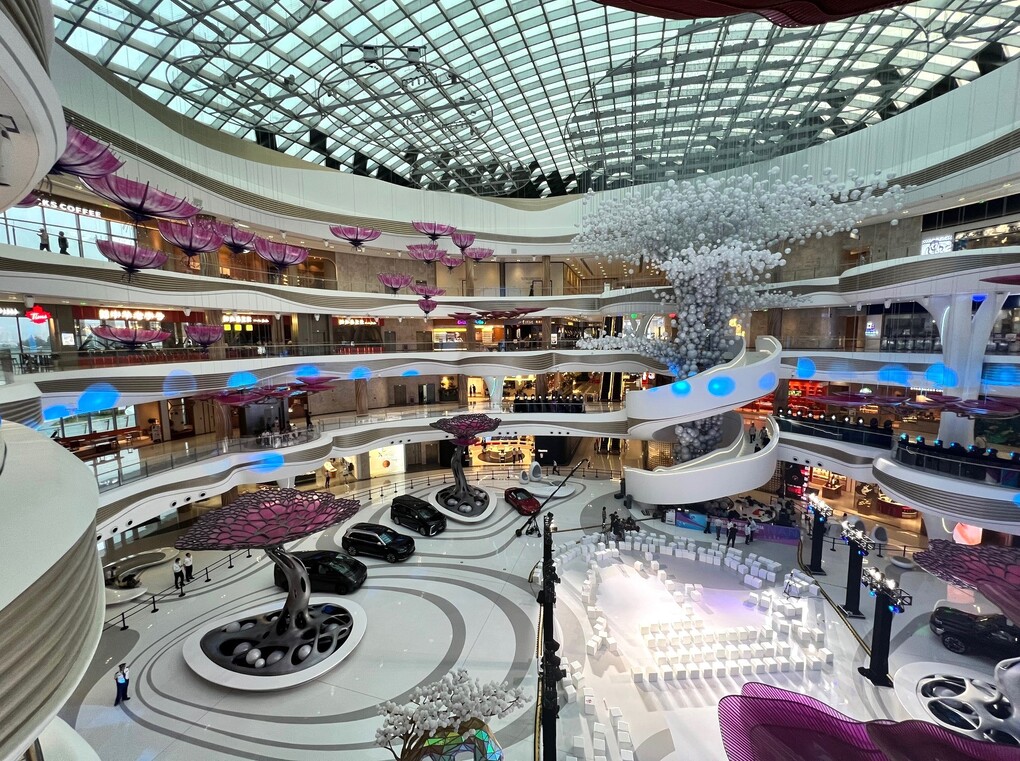SOUTH KOREA. Leading academics and tourism officials today called for urgent reform of the downtown duty free licensing system at a key policy seminar in Seoul.
The calls come amid a review of the five-year licensing scheme introduced in 2013, which has been the cause of controversy since the decision not to renew the Lotte Duty Free World Tower and WalkerHill Duty Free licences in Seoul.
The seminar, titled “˜Strengthening the competitiveness of the duty free business in Korea’ took place this morning at the country’s National Assembly (parliament) and attracted policy makers, Korea Customs officials, influential academics and national media, plus The Moodie Report representing the international travel retail community.
The heavyweight meeting was organised by the Korean Duty Free Association (KDFA) and Korea Distribution Association, and supported by National Assembly Vice Speaker Seok-hyun Lee and National Assembly Member Gwan-young Kim. The Korea Tourism Association and Korea Association of Travel Agents also lent their support.
Invited by the KDFA to put the Korean market in a global context, The Moodie Report President Dermot Davitt delivered a presentation (on behalf of Chairman Martin Moodie) and took part in a panel question and answer session with business journalists.
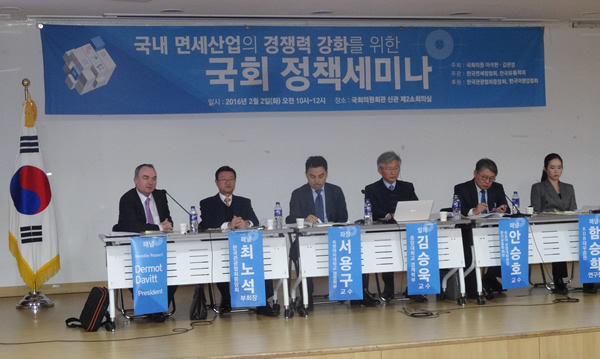
The policy seminar panel at Korea’s National Assembly included (l-r) The Moodie Report President Dermot Davitt, Korea Tourism Association Vice Chairman Noh-sok Choi, Sookmyung University Professor of Marketing (and moderator) Yong-gu Suh, Chung Ang University School of Economics Professor Seungwook Kim, Korea Distribution Association President Seung-ho Ahn and KDB Daewoo Securities Equity Analyst Regina Hahm |
Speakers highlighted the pivotal role of duty free shopping in Korean tourism; the risks and uncertainty associated with five-year licences; issued strong warnings about the rising market competition from Japan and China (the Chinese shopper is the core driver of Korean travel retail) and addressed public perceptions that the major duty free retailers were receiving “preferential treatment” with automatic licence renewals.
Setting the scene, Korea Duty Free Association Director General Won-seok Lee noted that Korea had become one of the world’s great shopping destinations for travellers, and that duty free was the driving force behind Korea’s sustained tourism growth, notably from China.
“This has traditionally been aided by government and by the association, but now we are worried about maintaining the business,” he said. “The reduction of the licensing period and the cancellation of automatic renewal represents a crisis. There is now fierce competition from around the world, with Japan establishing downtown duty free and China with the biggest duty free shop in Asia on Hainan Island.

Korea Duty Free Association Director General Won-seok Lee: “The situation is now very serious.” |
“We need a different marketing strategy and brands that are attractive to overseas visitors. Competitive prices and economies of scale have made the industry strong but this situation is now very serious.”
Keynote speaker and Chung Ang University School of Economics Professor Seungwook Kim said: “Jobs are central to society’s wellbeing, but jobs are not created by governments. People do not appreciate the key role that the big companies play in creating jobs.
“They take this for granted and instead, for a long time now, Koreans have regarded these big companies negatively. Duty free is seen as receiving special favours from government but that is not the case.
“Duty free is a very different market to other retail channels. The retailers cannot discount luxury brands and are restricted on price. The business needs lots of investment. The customer base is varied and trends change quickly. Shoppers mainly want international brands but not all retailers have the bargaining power to deal with them or the trust of those brands. Fixed costs are very high, as are sales and administrative expenses. There are also difficulties around exchange rates and risk factors as we saw with MERS last year.
“Therefore expertise and experience is required. You cannot assume that all retailers can enter this market.
“With that in mind, we should refrain from changing the regulations based on perceptions that these retailers operate as monopolies. They do not. In the 1980s there were 29 duty free operators in Korea but most of them failed because of competition, which many people are calling for more of today. Those that survived then did so because of strong entrepreneurship.
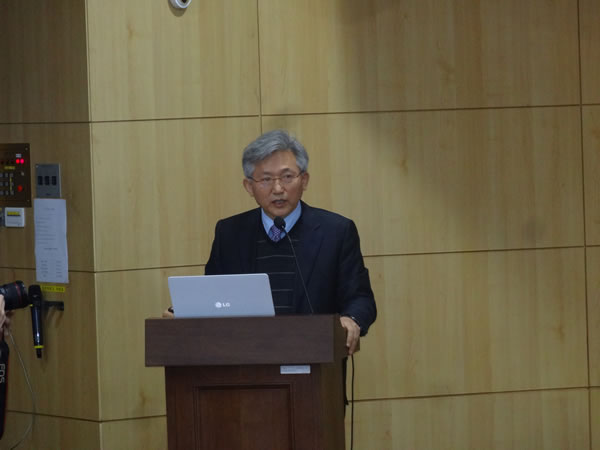
Chung Ang University School of Economics Professor Seungwook Kim: “For a long time now, Koreans have regarded the big companies negatively. Duty free is seen as receiving special favours from government but that is not the case.” |
“Licences do not mean special privileges, nor do they mean companies are avoiding taxes. The government protects the market by giving licences and they get rising royalties from these companies. Yet no other country penalises such companies as Korea does.
“As we see elsewhere, nations copy each other in their search to open the wallets of tourists and duty free and tourism should have a “˜synergy effect’. But we are going in the wrong direction. There has been a policy change but it has made things worse.”
Soongsil University Professor and Korea Distribution Association President Seung-ho Ahn said that introducing small and medium sized enterprises to the market had nothing to do with serving the public interest. Rather, he questioned how they could compete in “a unique market”.
He added: “Korea needs to improve its national brand image and compete with other neighbouring states to attract tourists. To operate in duty free you need experience.”
Professor Ahn is heading a task force charged with reviewing the licensing system and reporting to government with potential solutions. He said his report would be prepared within one month. A timeframe for any change remains unclear, with industry observers expecting any new regulations to take months to draw up and perhaps longer to introduce.

(Above and below) Lotte World Mall’s duty free licence was key to attracting Chinese tourists to the spectacular new Lotte World Tower. That licence was lost to industry newcomer Doosan Group despite a US$256 million investment and surging sales in 2015 |

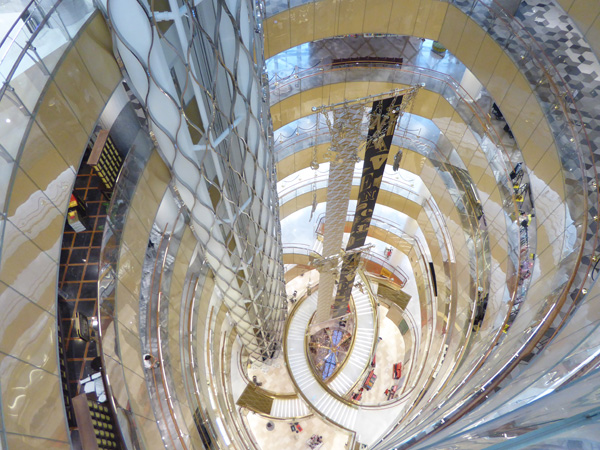
In a forceful address, Korea Tourism Association Vice Chairman Nok-sok Choi said that Korea was “giving up duty free dollars to Japan because of regulations.” He noted that tourism and duty free are closely linked, saying that half of visitors to Korea come to shop and 65% of those go to duty free stores. “The Chinese care deeply about shopping,” he said, adding that it was their prime reason to come to Korea.
“If we damage this industry people will choose other places like Japan. It is a zero sum game. We could all lose heavily if Korea becomes less attractive to visitors.”
He also questioned the closure of the Lotte World Tower and WalkerHill Duty Free stores. “Is this right?” he asked. “WalkerHill was established in the 1960s when the country had no foreign reserves for investment. It has provided many attractions from its casino to its duty free shop to visitors. Now it will close. The Lotte World Tower will become a landmark in Seoul and many visitors will go there. We will have 8 million Chinese visitors this year and 8-10 million soon, people who will spend US$1.2 billion here. What an opportunity! But without a duty free shop how much will be lost?”

KDB Securities Equity Analyst Regina Hahm (right): “The retailers that are losing their licences are bleeding. It’s time to stop.” |
KDB Daewoo Securities Equity Analyst Regina Hahm also spoke on the panel. She highlighted the challenges facing smaller retailers around securing inventory. “Luxury brands want limited distribution and not in all channels so they are very choosy. They want to deal with retailers who have a historical reputation.
“In Korea these licences are seen as privileges but there is no guaranteed margin, there is high risk for investment, foreign exchange challenges and they are not supported by government if they make a loss. The duty free retailers’ achievements are made with no government backing so those achievements should be evaluated properly.
“Korean cosmetics have been known in the wider world for only three years and duty fee was the starting point. We have a lack of export channels for these products and duty free is their big opportunity.
“Selecting newcomers does not change the structure of the business. The retailers that are losing their licences are bleeding, but it’s time to stop. We need to get rid of the uncertainty [around five-year licences]. There should be a renewal system, one where licences are renewed unless there is a reason to disqualify. The system needs to be reviewed and it needs in-depth discussion.
Dermot Davitt (presenting a speech on behalf of The Moodie Report Chairman Martin Moodie who is recuperating from surgery in London) said the decision to introduce five-year duty free licences that are the subject of competitive bids would:
*Hand a major shopping advantage to other Chinese tourism-generating rivals, notably Japan
*Disincentivise brands and retailers from investing in Korea
*Be highly unpopular with the world’s leading luxury brands
*Hurt the international competitiveness of Korean duty free retailers
*Fragment and weaken the Korean duty free market
*Damage the reputation of the Korean duty free industry
*Cause instability in the marketplace
*And lead to increased unemployment and job insecurity.”
He added: “The Korean duty free retailers, especially pioneers such as Lotte Duty Free and The Shilla Duty Free, are among the world’s most professional, particularly in terms of selling to Chinese travellers; the use of social media (particularly relating to Hallyumarketing); the championing of local products and the quality, range and service of the downtown duty free shops in particular.
“Korea didn’t become the world’s number one duty free market by accident. Such a status is testament to the huge investment that retailers such as Lotte, Shilla, SK Networks (WalkerHill), Shinsegae and others have poured into the market, and the quality of the offer down the years to Korean, Japanese and, critically, Chinese travellers.

The Moodie Report (President Dermot Davitt pictured) was invited to take part in the policy seminar to present the international industry context to the licensing controversy |
“The growth of Korean beauty products, especially, and Korean fashion and accessories, through the country’s duty free stores, is something unrivalled in the world and that Korea should be proud of. Duty free has also acted as a wonderful springboard for Korean brands abroad.
“Being the world’s number one market is commendable but there are also threats. At a time of global consolidation in the industry, almost no foreign observer can understand why the Korean government seems intent on fragmenting the country’s duty free business – and therefore weakening the hold of companies such as Lotte and Shilla.
“Many smaller players simply lack the understanding, resources and economies of scale to compete in such a complex environment.
The boom in Chinese tourist arrivals and duty free spending of recent years is a double-edged sword. It’s great for the economy (and for jobs) but the high exposure to one nationality is a concern – especially as other Asian countries such as Japan and Thailand are working overtime to attract Chinese travellers.
“Korea must redouble its efforts to serve Chinese travellers well, partly based on their love of shopping (and all things Korean) but also through enhanced tourism services. In my view you don’t achieve those goals by fragmenting the industry and weakening the key players.”
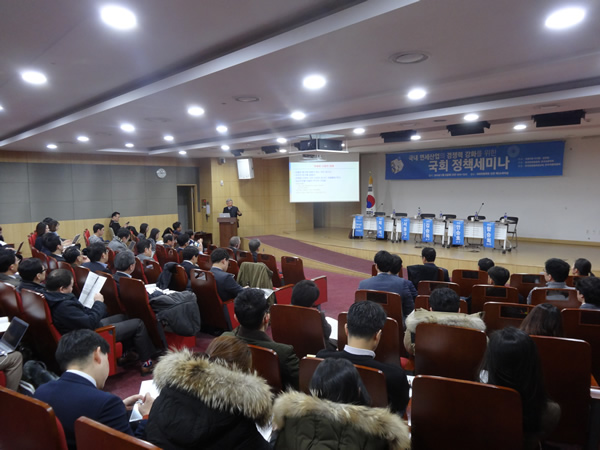
The policy seminar was supported by leading Korean politicians and attended by Korea Customs representatives, duty free retailers and key media outlets |

